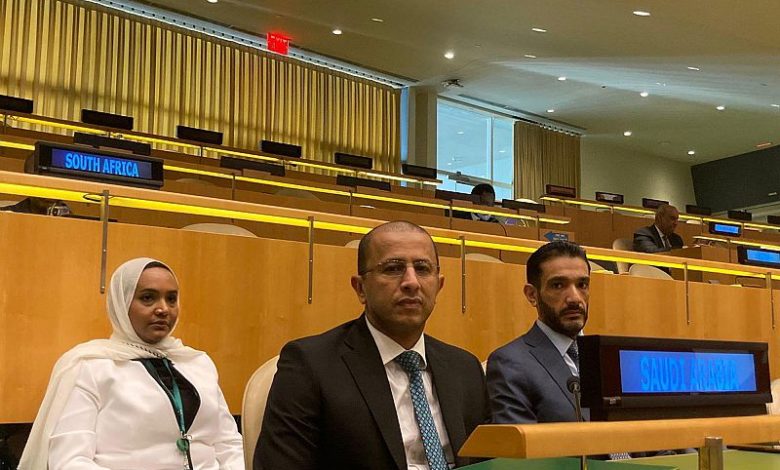KSA affirms its keenness to combat AIDS and enhance health individually and socially

Ashraf AboArafe
The Kingdom of Saudi Arabia/KSA affirmed its keenness to care and protect the health of its residents, including those with AIDS, indicating that it has done everything that would enhance the health of the individual and society in this regard, by providing preventive and curative programs to combat AIDS, especially with regard to combating stigma. discrimination, and preserving the rights of those infected, as well as working to protect young people, women and children from contracting this disease.
This came in the Kingdom’s speech delivered by the Acting Chargé d’Affairs to the Kingdom’s permanent delegation to the United Nations, Counselor Mohammed bin Abdulaziz Al-Ateeq, during the plenary session of the United Nations General Assembly in the discussion on the Declaration of Commitment on HIV (AIDS).
Al-Ateeq explained that the Kingdom established, in 1994 AD, the National AIDS Control Program, where a central national unit was created, along with twenty units spread across all regions of the Kingdom, noting that this program provides all services to prevent transmission of HIV infection, in addition to providing health care, including Psychosocial treatment and services.
He stated that the program is committed to educating and informing members of society, including the mother and child, about the disease, while providing continuous awareness campaigns in order to reach the global development goals.
He indicated that the services provided by the program include raising social awareness, in addition to launching policies that include treatment guides, counseling services and voluntary examination in fixed and mobile units.
Al-Ateeq said: Among the most prominent reforms that targeted the category of people living with AIDS in the Kingdom, is the issuance of the system for the prevention of acquired immunodeficiency syndrome (AIDS) and the rights and duties of those infected in 2018. necessary for the infected, ensuring their rights to continue education and work, obligating health authorities to provide health care, counseling and psychological support for the infected, respecting their rights, combating AIDS, explaining the means of transmission, methods of prevention and treatment, raising awareness of them, and urging people to avoid it.
He stressed that this system warns, in Article VI, against forcing an infected pregnant woman to have an abortion or depriving her of custody or care for her children because of her injury, and stressing the need to provide the necessary health care for her and her fetus.
He drew attention to the fact that although the Kingdom of Saudi Arabia is one of the countries with the lowest incidence of HIV infection that causes AIDS, the laws and regulations of the Kingdom prohibit every act or omission that discriminates against people with this disease, and leads to degrading their dignity or undermining their dignity. Their rights or exploitation due to their injury, as practices in this regard are a crime punishable by law with a fine or imprisonment, or both, without prejudice to the right of the aggrieved to claim compensation.
Al-Ateeq reiterated the Kingdom’s commitment to developing and implementing national plans and legislation to protect and care for the rights of its citizens and residents, indicating that the Kingdom supports regional and international strategies aimed at eliminating human immunodeficiency virus (AIDS) by 2030 in line with its legislative and national frameworks and religious values. and cultural.




